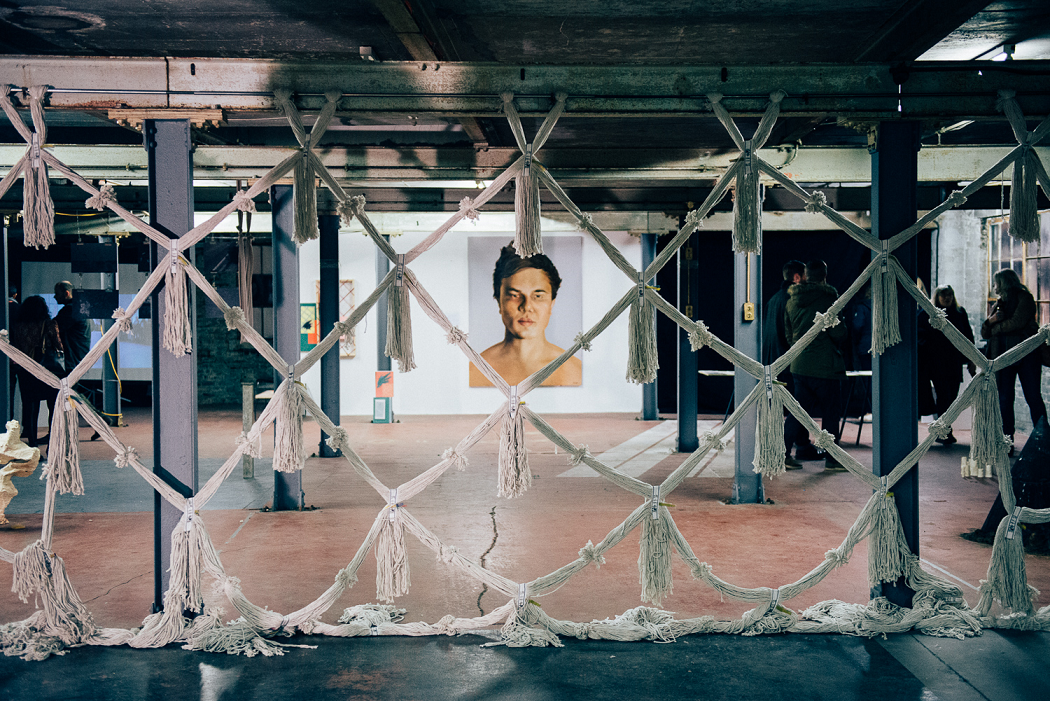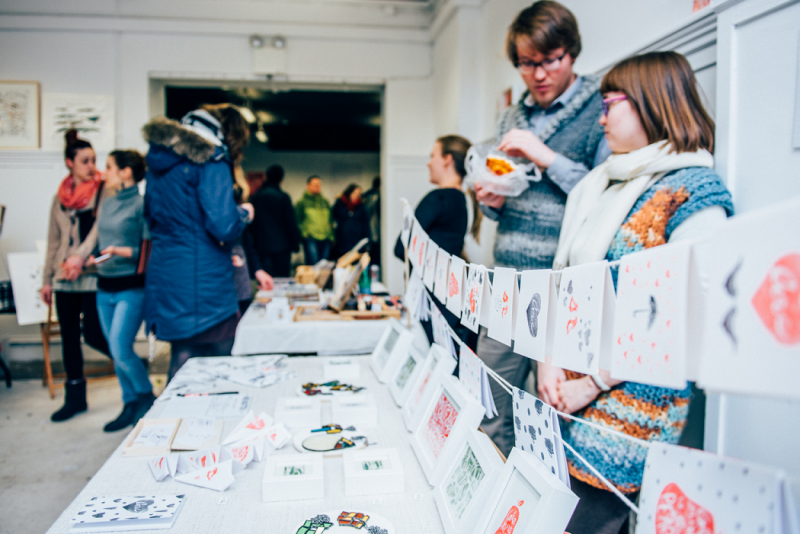
Seven&One collective at the Biscuit Factory, Chris Milne Photography
A DIY approach can make us better value the arts
The arts needs to lose a sense of purity and develop a start up attitude, argues festival director Briana Pegado.
These days the employment model is changing. More and more young people are not engaging with the graduate scheme career ladder, choosing instead to work for themselves.
The arts and creative sectors are being hailed as a source for innovation in this, but the business sector has always embraced D.I.Y tactics due to a lack of resources. That’s the very basis of a start-up. Like artists, start-ups take an idea and go through a creative process filled with emotional ups and downs, roadblocks, non-starters, inspiration and some sort of end product (or piece).
Any similarities between corporations and the art world have traditionally been shunned. But this eclipse of worlds is creating the conditions for the creative sector to have a big impact in a new way, and it is important the originators inspiring this renaissance, the artists and creatives, do not get the short end of the stick.
I believe the answer is to become more savvy about the realities of self-employment as an artist or creative. I believe the answer is going to a collective or a studio where your views are represented and needs are advocated for. But most importantly, I believe the only way we can be heard through the noise of social media, sound bites and GIFs is to embrace doing-it-yourself.

Doing-it-yourself can be a number of things. It can be creating an organisation, making a business, joining a start-up, starting freelancing. It can be designing, crafting, painting, or building – but in order to start something of your own there are a few things you need to do first:
- Have an idea
- Talk to others about your idea
- Allow yourself to pivot. Every business owner or entrepreneur knows their ideas changed quite a lot from when they first started. This doesn’t mean you should entirely shift focus or lose sight of your idea; it just means you should stay open to ‘pivoting’ as if you are on an axis. Your idea is the pivot point but as you change, grow and mature your angle may shift around your original idea.
- Get a coach, not a mentor. A mentor is someone that can lend a helping hand and provide advice, resources and contacts, but it is often difficult to know how often you should or can get in touch with them. A coach provides you that emotional support and wants to know all the finer details of everything else going on in your life.
A mentor may be interested in non-work related aspects of your personality but a coach knows that these elements of ‘you’ are part of their whole support process. They help you reflect rather than just give you answers and it is important to know the difference between the two.
- Take advantage of free support. Look through online resources, government resources (business gateway, CEO, etc.), and ask people for help
- Set yourself some goals that are achievable and realistic. Make sure they allow you to make critical decisions so that you can move your idea forward. SMART goals, though overused, are an extremely helpful way to make sure your goals are realistic. SMART stands for: Specific, Measurable, Achievable, Relevant, and Time-bound.
And if you can't manage all five for your idea, three out of five isn’t too bad.
- Find your tribe: a supportive community or a network. The creative process can be lonely, and so can the D-I-Y process. Speak to as many people that do want you want to do as possible. You need some positive reinforcement.
- Read, read, read. You need resources on the basics like accounting & finance, legal structures, or information on the materials/resources you will need).
- Then start
- And do not be afraid to fail. “There is only one thing that makes a dream impossible to achieve: the fear of failure.” – Paulo Coelho.
- Last but not least, remember to talk about what you’re doing. Write press releases, blog, post on Facebook, tweet, keep your supporters and funders updated and keep your family in the loop. This will help you stay motivated, inspire others and give you more opportunities.
Some other tips:
- There is no right way to do anything.
- Of course you may make mistakes, but you may also not make mistakes.
- Dare to try. You have nothing to lose if you have the right mindset.
- Make sure to focus on your own self-care. I am guilty of not-doing this more than anyone. I love to go to the cinema, for food or even to a gallery on my own. I have no trouble doing that. But when it comes to work and work I am passionate about, it is hard for me to say no.
I can be a perfectionist and with a start-up everything your organisation or team produces reflects directly back to you. It can be hard to remind myself something is better done than perfect and unfinished.
- Similarly, give yourself time limits. Do not respond to emails after a certain point in the evening. Tell your team (especially a team of student volunteers, who have an entirely different workweek) that you will not respond to anything over the weekend unless absolutely necessary.
Give yourself some time to work on your own practice. I have been in the ‘process’ of finishing an acrylic on canvas landscape for MONTHS now. Don’t do what I do with my productive procrastination.
- Do not do anything that will make you so financially insecure that your creativity and ability to take risks are stifled.
It is time for us to use the creative process to get innovative about the economy, our society and how the world works to raise each other up and, by critical mass, push the arts to be better valued by all. This will ensure fair pay, more general public interest, and the freedom for all of us to create and to realise our own potential.
Briana Pegado is Founder and Director of Edinburgh Student Arts Festival.
www.edinburghstudentartsfestival.com
Chris Milne is a photographer based in Edinburgh.
http://chrismilne.co/
Picture 2: EmporiumJulium at the stall market, by Chris Milne Photography
Picture 3: The Boy Calling the Kettle Wolf written and performed by RCS CPP graduates, by Chris Milne Photography

Join the Discussion
You must be logged in to post a comment.